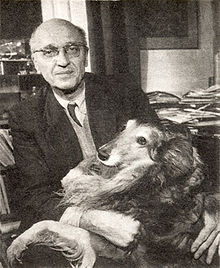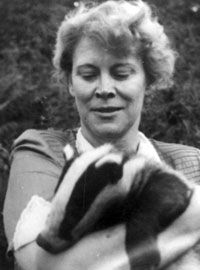

Born: 8 April 1897, Warsaw (Russian partition of Poland),presently Poland
Died: 26 July 1974, Warsaw, Poland.
Early days. His parents: Jozef and Helena born Strzeszewska. His wife Antonina was born Erdman. Before WWI he practiced track and field and run 100m in 11.1 sec., a result very good in those times. After WWI he studied agriculture at SGGW (Agricultural University) and got the title of an Engineer of Agronomy. Then he got a doctorate in physiology at the Warsaw University and was habilitated at the Maria Curie-Sklodowska University in Lublin, Poland.
Career. As of 1919 he served in the Polish army and took part in the Polish-Bolshevik war of 1920. In 1929 (till 1951) he became the director of the Warsaw Zoo and additionally superintendent of the city's public parks during the Nazi occupation. During 1918-1944 he was teaching in the high schools and in SGGW (Agricultural Academy).
WWII. On the eve of the German occupation, Żabiński was director of the Warsaw Zoo and a teacher of geography in the private gymnasium of Kreczmar. The Germans appointed him superintendent of the city's public parks as well. In September 1939 the Warsaw Zoo was bombed bythe Germans. Many animals died or escaped from the Zoo. The Nazis took many of the remaining animals to other Zoos (among others: in Koenigsberg, Hanower and Vienna). Żabiński maintained contact with prewar Jewish colleagues and friends and helped them escape and find shelter on the "Aryan" side of the city. The emptied cages Zabinski and his wife used to hide Jews smuggled from Warsaw ghetto. Zabinski took part in this smuggle visiting ghetto under the appearance of looking for organic waste to feed the pigs raised then in the Zoo. Over the course of three years, hundreds of Jews found temporary shelter in these abandoned animal cells, located on the eastern bank of the Vistula River, until they were able to relocate to permanent places of refuge elsewhere. In addition, close to a dozen Jews were sheltered in Żabiński's two-story private home on the zoo's grounds. Among others they saved the sculptress Magdalena Gross. In this dangerous undertaking he was helped by his wife, Antonina, a recognized author, and their young son, Ryszard, who nourished and looked after the needs of the many distraught Jews in their care. At first, Żabiński paid from his own funds to subsidize the maintenance costs; then money was received through Żegota: Council to Aid Jews. He also taught in the underground Warsaw University. An active member of the Polish underground Armia Krajowa (Home Army), Żabiński participated in the Warsaw Polish Uprising in August and September 1944 as a platoon leader. He was heavily wounded and upon the suppression of the uprising, taken as a prisoner to Germany. His wife continued his work, looking after the needs of some of the Jews left behind in the ruins of the city.
After WWII. He returned to Poland at the end of 1945 resuming his research and popularization works mainly in Polish Radio. He delivered more than 1500 talks becoming the listeners’ favorite. Since 1947 he became a member of Of the State Council of Nature Preservation. He popularized the action of returning the visent (bison’s cousin) to the nature editing "Księgi Rodowodowe Żubrów.” In 1951 he was forced to resign from the position of the the director of Warsaw Zoo. In the period 1952-1954 he taught in Państwowej Wyższej Szkole Pedagogicznej in Warsaw. ). Żabiński also authored approximately 60 popular science books , 6 translations and 32 research papers.
Awards. 1920 Cross of Valor; 1944 Cross of Valor; September 21, 1965 Jan and Antonina Zabinski recognized by Yad Vashem as Righteous Among Nations; October 30, 1968 a tree planting ceremony was held at Yad Vashem honoring Righteous Among the Nations, including Jan and Antonina Żabiński; 1980 one of Warsaw’s street named after Zabinski; 2007, the U.S. writer Diane Ackerman published The Zookeeper's Wife, a book about the Żabiński family's wartime activities that draws upon Antonina Żabińska's diary; Commander’s Cross of the Order of Polonia Restituta; prize of Warsaw the Capital; Bruno Winawer’s prize; Polish Radio’s prize: Golden Microphone; 2009 Polish translation of Ackerman’s book Azyl.
Based on an article that appears in Wikipedia (with modifications)and includes a list of his books:
Wikipedia
Text is available under the Creative Commons Attribution-ShareAlike License; additional terms may apply.
Other sources:
Wikipedia in Polish
Zabinski at Yad Vashem website
Publlshed on5/11/15
Return to home page:
Prominent Poles